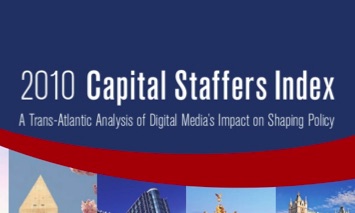 Today, Edelman released the findings of our 2010 Capital Staffer Index during an event hosted in the Washington, DC office. Edelman’s Public Affairs & StrategyOne teams interviewed senior legislative staffers around the globe in several capital cities including Berlin, Brussels, London, Paris and Washington to determine the role and influence of various communications channels both online and off. Below are some of my initial — and personal — thoughts about the U.S. survey results.
Today, Edelman released the findings of our 2010 Capital Staffer Index during an event hosted in the Washington, DC office. Edelman’s Public Affairs & StrategyOne teams interviewed senior legislative staffers around the globe in several capital cities including Berlin, Brussels, London, Paris and Washington to determine the role and influence of various communications channels both online and off. Below are some of my initial — and personal — thoughts about the U.S. survey results.
Citizen Engagement in the Digital Age
When Barack Obama was sworn-in as the 44th President of the United States in January 2009, much was written about his campaign’s effective use of digital and social media tools to build support, reach new audiences and engage younger voters. Many credit those efforts as being critical to his successful bid for the White House.
Once in office, it was largely expected that the Obama Administration would utilize similar digital strategies for government application. They set out to build on the foundation laid by their predecessors by seeking to leverage emerging digital outlets to better serve and connect with Americans while simultaneously adapting to a rapidly evolving media landscape. The same was true for Capitol Hill.
Growing, Growing, Gone?
The 2010 Capital Staffers Index demonstrates significant increases in digital media including four-times the usage of Facebook compared to three years ago, nearly double for text messaging, almost three-times for blogs and over five-times worth of growth for Twitter. During key policy debates on issues such as the economy, jobs, healthcare, national security, energy and immigration, constituents flocked to the Internet to make their voices heard.
Members of Congress and Hill staffers quickly learned how to navigate in these new channels through direct constituent engagement and the creation of content best suited for social media and networking sites such as Facebook, Twitter, YouTube and Flickr. In many cases, such content was embedded on official House and Senate “dot gov” sites to augment message reach, optimize digital footprints and increase the opportunity for sharing across various social platforms.
In May 2010, the House Republican leadership even created their own unique digital channel with the launch of “America Speaking Out.” The site was built to serve as an online clearinghouse for crowd-sourced policy ideas with the best rising to the top based on community votes. However, sites like this aren’t designed with the intent of completely replacing traditional methods of contacting Congress such as in-person meetings, phone calls, letters and e-mail which are all still effective in many ways. Rather, they simply open up new avenues to connect.
Similarly, though the rise in social media and digital engagement is remarkable, let’s be careful not to write obituaries for mainstream media outlets just yet. Newsrooms may be shrinking but according to the survey results, their influence on Capitol Hill sure isn’t. For staffers, online news sites remain valuable and consistently rank far above social networks, blogs and social media with the highest usage (64%) occurring from 9 AM to 10 AM and the lowest (42%) from 5 PM to 6 PM.
The Key To Surfing Is… Timing
One of the most interesting findings in the 2010 Capital Staffers Index is how online activity trends throughout the day. Heavy traffic for online news sites early in the morning are likely due to staff who are preparing for briefings, conducting research or just getting caught up on the news of the day.
For the most part, social networks run a distant second in usage percentage when to compared online news sites with two exceptions where they experience significant spikes both during the lunch hour (31% from 12 PM to 1 PM) and at the end of a typical work day (tied with online news at 46% after 6 PM). This would seem to suggest that Hill staffers utilize social networking sites all day for both personal and professional purposes, with an emphasis on the personal during perceived down time.
The Next Wave
Two short years after President Obama’s historic victory, the political tide seems to be turning once again. Perhaps the November 2010 midterm election will most certainly be remembered for the GOP’s sweeping wins, especially in the House of Representatives where Republicans netted over 60 seats, the biggest gain since 1938 when the Democrats lost 71.
In preparation for the start of the 112th Congress, freshman members will endure orientations, elect party leadership, set legislative agendas, learn shortcuts from their new offices to committee rooms, attend briefings and of course, hire various key staff. Many likely campaigned heavily online – but now politicians and staffers alike find themselves in positions of power with great responsibility where they must learn to govern online, as well.
For those who are either unable to accept or unwilling to embrace these new communications realities, perhaps these words from American philosopher, writer and 1983 Presidential Medal of Freedom recipient Eric Hoffer will serve as encouragement, “In times of change, learners inherit the earth; while the learned find themselves beautifully equipped to deal with a world that no longer exists.”


Tweets that mention CapitalGig » Blog Archive » 2010 Capital Staffers Index -- Topsy.com
[…] This post was mentioned on Twitter by Jeremy Epstein, CapitalGig. CapitalGig said: 2010 Capital Staffers Index: Today, Edelman released the findings of our 2010 Capital Staffer Index during an ev… http://bit.ly/gtlsic […]